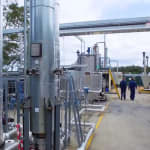
The European Commission’s Joint Research Centre (JRC) has published a Life Cycle Assessment report which benchmarks three thermal advanced plastic recycling technologies against waste to energy and mechanical recycling in terms of carbon emissions.
The JRC’s report shows that Mura’s HydroPRS Technology – referred to in the report as CR(III) - has a global warming potential (GWP) that is circa 50% lower than the other advanced recycling process (pyrolysis). HydroPRS was also shown to be the best performing for ‘resource use’ across mechanical, chemical and energy recovery processes, indicating highest yield of hydrocarbon products that displaces virgin fossil equivalent.
The JRC’s findings demonstrate that HydroPRS complements mechanical recycling by processing residual plastic waste streams that cannot otherwise be recycled by mechanical means.
"The JRC comparative assessment shows that HydroPRS is inherently more efficient and scalable than other technologies within the sector, offering the lowest carbon intensity for the production of premium oil products,” commented Dr Steve Mahon, Mura’s Chief Executive Officer. “As the global economy transitions away from fossil fuels, using HydroPRS as a complementary technology to mechanical recycling has significant environmental and circular benefits.”
Dr Geoff Brighty, Mura’s Chief Sustainability Officer added, “The JRC’s report proves that when HydroPRS is compared to both energy recovery and the alternative treatments of unrecyclable waste plastic feedstock, it offers best in class environmental credentials. However, as Mura continues to strive for Net Zero, we are already working on further reducing our emissions by recycling process gas, taking advantage of process electrification and using renewable energy supplies. We believe the advanced recycling sector has a big role to play in developing a circular economy and look forward to working with DG GROW and the JRC to make that a reality.”
The LCA report from JRC can be accessed and read here: Environmental and economic assessment of plastic waste recycling.



